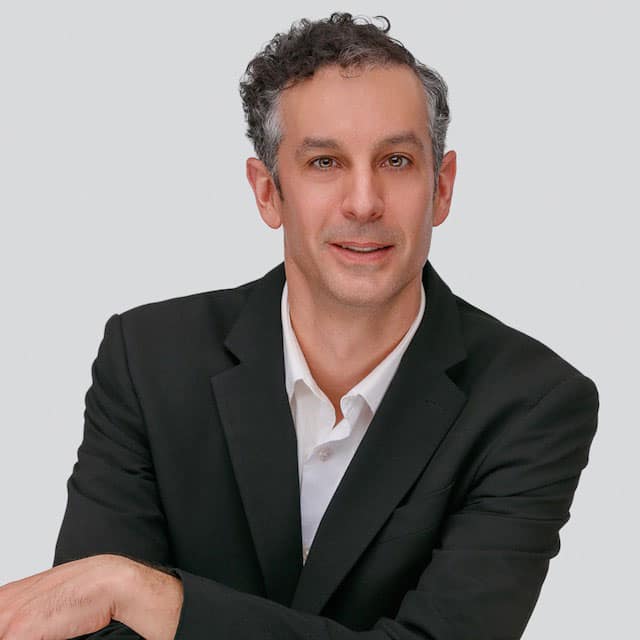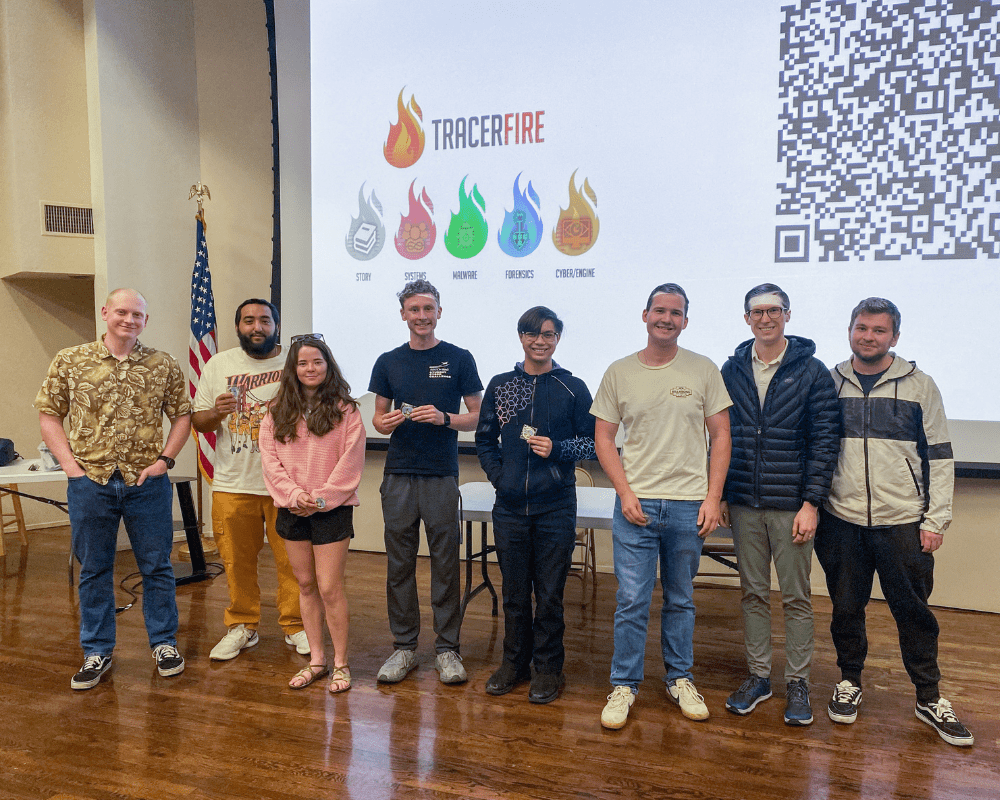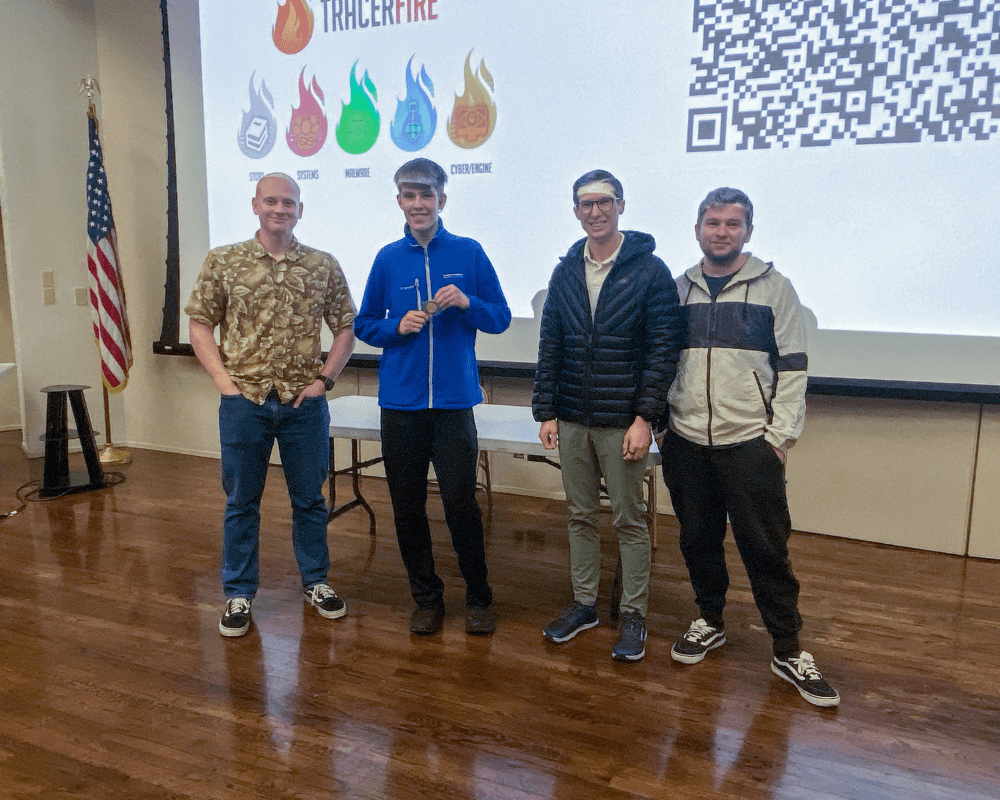

Embry-Riddle Students Share Insights About Their Wins at Cybersecurity Competition Tracer FIRE 12

Embry-Riddle Aeronautical University’s Prescott Campus recently hosted the 12th annual Tracer FIRE cybersecurity competition, sponsored by Sandia National Laboratories, from October 25-27, 2024. Learn about the background of the Tracer FIRE series and the learning scenario behind this year’s event in our prequel article.
This year, Embry-Riddle students achieved remarkable success, placing in some of the highest rankings within the nation. Dr. Krishna Sampigethaya, the College of Business, Security and Intelligence’s Department of Cyber Intelligence and Security chair and professor at Embry-Riddle, proudly shared, “The student teams from Embry-Riddle Prescott Campus’s Department of Cyber Intelligence and Security took all three top positions. The first-place team, consisting of Justin La Zare (’25), Nathan Johnson (’26), Jesse Hix (’26), Jacob Boesen (’25) and Bernard Correa III (’24), solved 96% of the challenges — the highest completion rate in any Tracer FIRE 12 event this year. Additionally, freshman Aaron Tulino (’28) earned the highest individual score.”
The second-place team consisted of Nicholas Harris (’26), Brandon Greenaway (’26), Kaimana Wong (’27), Calvin Lindemann (’26) and Brandon Chua (’26).
The third-place team comprised Michael Boehm (’26), Nichole Thomas (’25), Kamryn Hoehne (’25), Rebekah Sokoloski (’26) and Kyle Wheaton (’26). Among all the winners from Embry-Riddle, four were honored as National Science Foundation Scholarship for Service (NSF SFS) scholars, and one was recognized as a scholar from the Department of Defense Cyber Security Academy (DoD CSA).
Speaking with some of the competitors this year, it’s clear that the students learned a lot and had a fun time along the way. Consider the following insights from the members of this year’s first-place team.
Graduate Student Insights
Justin La Zare, a graduate student studying Cyber Intelligence and Security (’25) and an NSF SFS scholar, reflects upon his experiences:
What were the greatest challenges for your team and how did you overcome them so effectively?
Our biggest challenge was interpreting some of the questions, which weren’t always straightforward. In one case, we were stuck until support became available due to a missing clue. To move forward, we tried to think like the challenge creators, anticipating what they wanted us to find at each step. Each of these lines of questioning was supposed to simulate an actual investigation. This mind shift helped us navigate unclear wording and make progress.
How has Embry-Riddle prepared you for success in this event?
Embry-Riddle prepared us through experience in competitions, research, internships and mentorship from faculty and fellow students. These opportunities build our digital response and incident response (DFIR) skills, and the university’s support for Tracer FIRE gave us a chance to practice under pressure, refining our skills over the last three Tracer FIRE events.
Was there a great learning lesson that this collaborative event inspired?
A shared, organized system for notes and communication allowed us to pass challenges between each person, maximizing each person’s unique skill set. This setup helped us build a lead early on and maintain it while also allowing us to put together a strong presentation in the context of the scenario.

FIRST PLACE TEAM
Individual Winner Insights
Aaron Tulino reflects upon his experiences winning the highest individual score:
What were the greatest challenges you faced during the event and how did you overcome them so effectively?
For me, the main challenge throughout the competition was learning the tools we needed to use on the fly. We were given three main programs called Kibana, Malcolm and Velociraptor, which I had never heard of or used before the competition. The people running it did a great job of showing us the basics, and I enjoyed playing around with them throughout the competition and learning how to use them effectively for each challenge.
How has Embry-Riddle prepared you for success in this event?
I learned a lot of useful information and concepts from the Cyber Defense Club and Ethical Hacking Club here on campus. They helped prepare me for the event, and I've really enjoyed the fun challenges they've made for us. I've also met some great people through those meetings, and I'm really looking forward to what the future holds.
What was your most memorable moment during the event?
The moment I remember most was when I finally solved a problem I'd been working on for a long time and realized it was the last challenge in its section. I spent several hours trying to figure out how to tackle it late at night and eventually gave up and went to sleep. When I woke up, I had come up with some new ideas to try, which wound up helping me to find the last piece of information I needed to complete the challenge.
Was there a great learning lesson that this collaborative event inspired or something you learned about yourself in the process?
My personal takeaway was that I picked the right career path. I used to want to be a software developer, but I decided on cybersecurity instead. Since then, I've felt imposter syndrome at times... but Tracer FIRE proved to me that it was the right choice after all.

HIGHEST INDIVIDUAL SCORE
Making an Impact
Viewed through a different lens, Dr. Sampigethaya considers the significance of Tracer FIRE 12 for the parents of future Eagles in the audience, reminding us all that there are no limits to our educational ambition.
Dr. Sampigethaya recounts an observation by Dr. Thomas Drape, dean of the College of Business, Security and Intelligence, who attended Open House held the same weekend as Tracer FIRE 12. Dr. Drape noted a parent saying, “I am sold and I wish that I could go back to school.”
